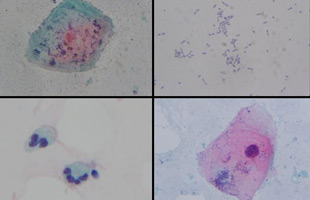Infection screening
Our health is very dependent upon the balance of microorganisms that live in and on us. An imbalance in the microbiome in the reproductive system in both men and women can lead to infection and inflammation, which may be an underlying cause of infertility. Importantly, evidence is coming to light that urinary and genital tract infections may be linked to unexplained infertility, failure of fertility treatment and recurrent miscarriage.
How Infections May Affect Fertility
- reduces sperm motility, vitality, count, shape and function
- affects seminal fluids which are important for sperm transport and function
- causes inflammation and oxidative stress
- causes sperm DNA damage
- may cause obstruction resulting in no sperm in the ejaculate (azoospermia)
- may trigger sperm antibody production (immunological infertility)
- may cause female infertility
- decreases chances of conception and increases rate of miscarriage
- may cause birth defects
Genital tract infections are very common and the majority are acquired from the body’s own microbial flora. Some may be sexually transmitted and may have been present for many years unbeknown to you.
Prostatitis
Prostatitis is an inflammation of the prostate gland, and is very common, affecting as many as one in two men at some point in their lives. More recently, it appears that prostatitis may also affect fertility as it occurs twice as often in infertile men than in fertile men. Prostatitis may be caused by bacteria in which case it may be treated with antibiotics, but often the cause of prostatitis is unclear. Pus cells produced as part of the inflammatory process, are a major source of unstable free radicals which causes oxidative stress and sperm DNA damage. Prostatitis may be associated with abnormalities in sperm shape, reduced sperm motility, sperm antibodies and a decrease in the sperm’s ability to interact with the egg.
Symptoms of infection or prostatitis
Symptoms of infection may include a urethritis, urethral discharge, discomfort or pain while urinating or during intercourse and swelling. However, in many cases, there may be no symptoms at all, the so-called silent infections. Indeed 80% of Chlamydia infections in women and 50% in men have no symptoms. Silent infections may be present in as many as 20% men with fertility issues.
You may experience any combination of a range of symptoms if you have prostatitis including increased frequency of urination, occasional discomfort, pain or aching in the testicles, urethra, lower abdomen and back area. Pain or discomfort on urination or ejaculation is quite common. Some men may even stop having sex due to prostate pain and the constant aching after ejaculation.
Investigations
Andrology Solutions specialise in infection screening for male infertility. We would recommend this even if you have no symptoms, especially if you have a history of long-term unexplained infertility, multiple failed attempts at assisted conception and recurrent miscarriage in your partner.
Investigations will depend upon your individual circumstances and may include a urine test and a semen culture. We may also recommend testing vaginal swabs for your partner. Severe cases of prostatitis will need to be investigated by a specialist Urologist outside of the clinic. It is important for couples to be investigated and treated at the same time, otherwise the infections may recur.
Treatment
Most diagnosed bacterial infections can be treated effectively with antibiotics. It is also important to take probiotics to keep the harmful bacteria under control. Although prostatitis may not always be treated, in some cases, it is possible to reduce the symptoms by managing stress, improving diet and treating with antibiotics if appropriate.

Fertility Testing
- Comprehensive semen analysis
- Sperm DNA damage and genetic screening
- Oxidative stress
- Retrograde ejaculation
- Infection screening
- Testicular ultrasound scanning
- Hormone profiles
- Well man screening
Have a question?
We understand that fertility is a very personal and private matter. We’re here to answer any questions you may have. Contact us to arrange an appointment or read our FAQs.

1 thought on “Infection screening”